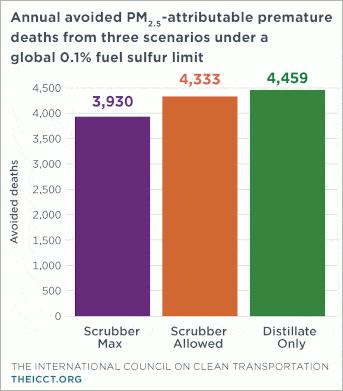
The International Council on Clean Transportation (ICCT), l
An independent non-profit organization created to promote the
improvement of the environmental performance of the
transport, highlighted the need to extend
the application of the limit of 0.1% of the sulphur content in fuels
beyond the scope of the Emission Control Areas (ECAs) in which
is currently in force. The ICCT recalled that
the International Maritime Organization has progressively tightened up
limits on the sulphur content of marine fuels
to safeguard human health and the environment by also introducing
stricter limits in ECA areas low emission area
air pollutants and whereas, therefore, ships currently have to
comply with an overall limit of 0.5% sulphur in fuels, and
a limit of 0.1% in ECA areas unless they use
scrubbers, the equipment installed on board ships to
reduce emissions by cleaning exhaust gases. "However –
highlighted today by the ICCT - studies have shown that ships that
use scrubbers with heavy fuel oil emit more
particulate matter and black carbon compared to those using diesel
for maritime use'.
ICCT then presented an analysis that assesses how
a further reduction globally of the maximum content of
sulphur allowed in fuels, going from 0.5% to 0.1%,
could affect emissions of air pollutants and
premature mortality from fine particulate matter (PM2.5).
The analysis considers three compliance paths. A first course
"Scrubber Max" scenario in which ships using
very-low sulfur fuel oil (VLSFO)
intermediate with low sulfur content (<0.5%), switch to oil
HFO heavy fuel with high sulfur using
scrubber to comply with the global limit of 0.1% sulphur in
fuels. A second "Scrubber Allowed" scenario in
which ships equipped with scrubbers use them to comply with the
0.1% sulphur limit and ships without scrubbers
normally used VLSFO switch to MGO marine diesel to
comply with and with ships using other fuels such as LNG
or methanol that continue to use these fuels. The analysis
notes that this scenario can be considered the
most likely compliance path based on
regulations in force as scrubbers are currently allowed
as an alternative means of complying with IMO regulations on the
sulphur in fuels, except in national courts or
where they are restricted. Finally, one
"Distillate Only" scenario where scrubbers are not
permitted and ships using primary fuels or
residual, regardless of the presence or absence of a scrubber,
to the MGO to comply, while it has been assumed that
ships using other fuels, such as LNG or methanol,
continue to use them.
 The ICCT analysis finds that, compared to a baseline scenario
based on 2023 vessel traffic data, reduce the content
of sulphur in marine fuels to comply with a limit of
sulphur of 0.1% would allow in the first place to mitigate
air pollution. In particular, with reference to the three
compliance scenarios, it is estimated that emissions of
attributable to maritime transport would decrease by
75%-85%, PM2.5 emissions 46%-66% and elemental carbon emissions
by 27%-41%, with the scenario banning scrubbers that would produce
the largest estimated emission reductions.
The ICCT analysis finds that, compared to a baseline scenario
based on 2023 vessel traffic data, reduce the content
of sulphur in marine fuels to comply with a limit of
sulphur of 0.1% would allow in the first place to mitigate
air pollution. In particular, with reference to the three
compliance scenarios, it is estimated that emissions of
attributable to maritime transport would decrease by
75%-85%, PM2.5 emissions 46%-66% and elemental carbon emissions
by 27%-41%, with the scenario banning scrubbers that would produce
the largest estimated emission reductions.
In addition, extending the 0.1% limit would make it possible to reduce
premature deaths. The analysis shows that the three scenarios of
compliance would make it possible to avoid between 3,930 and 4,459
premature deaths per year, with the most
obtained when scrubbers are not allowed.
Finally, there would be significant economic benefits. It is estimated,
in fact, that the economic health benefits would vary between 9.3
and $10.9 billion per year depending on the
compliance and the use of more fuelled fuel would be incentivised.
with an overall standard of 0.1% of the sulphur content that
would have the effect of increasing the costs of fossil fuels and
reduce the price gap between conventional fuels and
those with zero or almost zero greenhouse gas emissions.